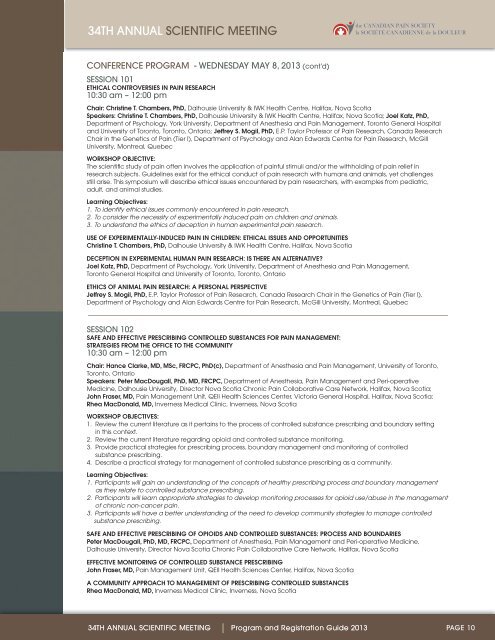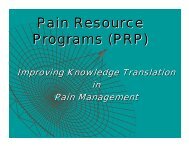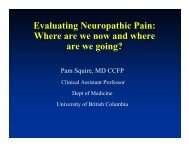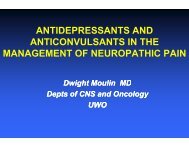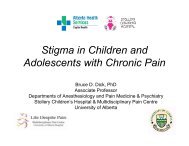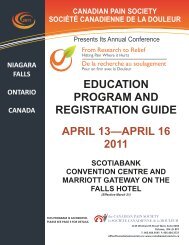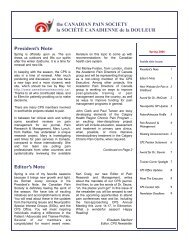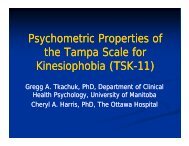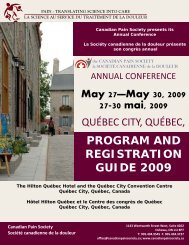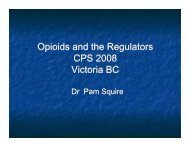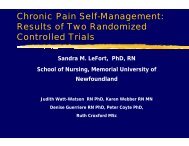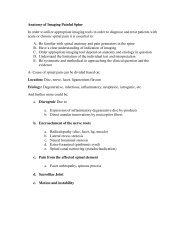Registration & Program Guide - The Canadian Pain Society
Registration & Program Guide - The Canadian Pain Society
Registration & Program Guide - The Canadian Pain Society
Create successful ePaper yourself
Turn your PDF publications into a flip-book with our unique Google optimized e-Paper software.
34TH ANNUAL SCIENTIFIC MEETING<br />
CONFERENCE PROGRAM - WEDNESDAY MAY 8, 2013 (cont’d)<br />
SESSION 101<br />
ETHICAL CONTROVERSIES IN PAIN RESEARCH<br />
10:30 am – 12:00 pm<br />
Chair: Christine T. Chambers, PhD, Dalhousie University & IWK Health Centre, Halifax, Nova Scotia<br />
Speakers: Christine T. Chambers, PhD, Dalhousie University & IWK Health Centre, Halifax, Nova Scotia; Joel Katz, PhD,<br />
Department of Psychology, York University, Department of Anesthesia and <strong>Pain</strong> Management, Toronto General Hospital<br />
and University of Toronto, Toronto, Ontario; Jeffrey S. Mogil, PhD, E.P. Taylor Professor of <strong>Pain</strong> Research, Canada Research<br />
Chair in the Genetics of <strong>Pain</strong> (Tier I), Department of Psychology and Alan Edwards Centre for <strong>Pain</strong> Research, McGill<br />
University, Montreal, Quebec<br />
WORKSHOP OBJECTIVE:<br />
<strong>The</strong> scientific study of pain often involves the application of painful stimuli and/or the withholding of pain relief in<br />
research subjects. <strong>Guide</strong>lines exist for the ethical conduct of pain research with humans and animals, yet challenges<br />
still arise. This symposium will describe ethical issues encountered by pain researchers, with examples from pediatric,<br />
adult, and animal studies.<br />
Learning Objectives:<br />
1. To identify ethical issues commonly encountered in pain research.<br />
2. To consider the necessity of experimentally induced pain on children and animals.<br />
3. To understand the ethics of deception in human experimental pain research.<br />
USE OF EXPERIMENTALLY-INDUCED PAIN IN CHILDREN: ETHICAL ISSUES AND OPPORTUNITIES<br />
Christine T. Chambers, PhD, Dalhousie University & IWK Health Centre, Halifax, Nova Scotia<br />
DECEPTION IN EXPERIMENTAL HUMAN PAIN RESEARCH: IS THERE AN ALTERNATIVE?<br />
Joel Katz, PhD, Department of Psychology, York University, Department of Anesthesia and <strong>Pain</strong> Management,<br />
Toronto General Hospital and University of Toronto, Toronto, Ontario<br />
ETHICS OF ANIMAL PAIN RESEARCH: A PERSONAL PERSPECTIVE<br />
Jeffrey S. Mogil, PhD, E.P. Taylor Professor of <strong>Pain</strong> Research, Canada Research Chair in the Genetics of <strong>Pain</strong> (Tier I),<br />
Department of Psychology and Alan Edwards Centre for <strong>Pain</strong> Research, McGill University, Montreal, Quebec<br />
SESSION 102<br />
SAFE AND EFFECTIVE PRESCRIBING CONTROLLED SUBSTANCES FOR PAIN MANAGEMENT:<br />
STRATEGIES FROM THE OFFICE TO THE COMMUNITY<br />
10:30 am – 12:00 pm<br />
Chair: Hance Clarke, MD, MSc, FRCPC, PhD(c), Department of Anesthesia and <strong>Pain</strong> Management, University of Toronto,<br />
Toronto, Ontario<br />
Speakers: Peter MacDougall, PhD, MD, FRCPC, Department of Anesthesia, <strong>Pain</strong> Management and Peri-operative<br />
Medicine, Dalhousie University, Director Nova Scotia Chronic <strong>Pain</strong> Collaborative Care Network, Halifax, Nova Scotia;<br />
John Fraser, MD, <strong>Pain</strong> Management Unit, QEII Health Sciences Center, Victoria General Hospital, Halifax, Nova Scotia;<br />
Rhea MacDonald, MD, Inverness Medical Clinic, Inverness, Nova Scotia<br />
WORKSHOP OBJECTIVES:<br />
1. Review the current literature as it pertains to the process of controlled substance prescribing and boundary setting<br />
in this context.<br />
2. Review the current literature regarding opioid and controlled substance monitoring.<br />
3. Provide practical strategies for prescribing process, boundary management and monitoring of controlled<br />
substance prescribing.<br />
4. Describe a practical strategy for management of controlled substance prescribing as a community.<br />
Learning Objectives:<br />
1. Participants will gain an understanding of the concepts of healthy prescribing process and boundary management<br />
as they relate to controlled substance prescribing.<br />
2. Participants will learn appropriate strategies to develop monitoring processes for opioid use/abuse in the management<br />
of chronic non-cancer pain.<br />
3. Participants will have a better understanding of the need to develop community strategies to manage controlled<br />
substance prescribing.<br />
SAFE AND EFFECTIVE PRESCRIBING OF OPIOIDS AND CONTROLLED SUBSTANCES: PROCESS AND BOUNDARIES<br />
Peter MacDougall, PhD, MD, FRCPC, Department of Anesthesia, <strong>Pain</strong> Management and Peri-operative Medicine,<br />
Dalhousie University, Director Nova Scotia Chronic <strong>Pain</strong> Collaborative Care Network, Halifax, Nova Scotia<br />
EFFECTIVE MONITORING OF CONTROLLED SUBSTANCE PRESCRIBING<br />
John Fraser, MD, <strong>Pain</strong> Management Unit, QEII Health Sciences Center, Halifax, Nova Scotia<br />
A COMMUNITY APPROACH TO MANAGEMENT OF PRESCRIBING CONTROLLED SUBSTANCES<br />
Rhea MacDonald, MD, Inverness Medical Clinic, Inverness, Nova Scotia<br />
34TH ANNUAL SCIENTIFIC MEETING <strong>Program</strong> and <strong>Registration</strong> <strong>Guide</strong> 2013 PAGE 10


